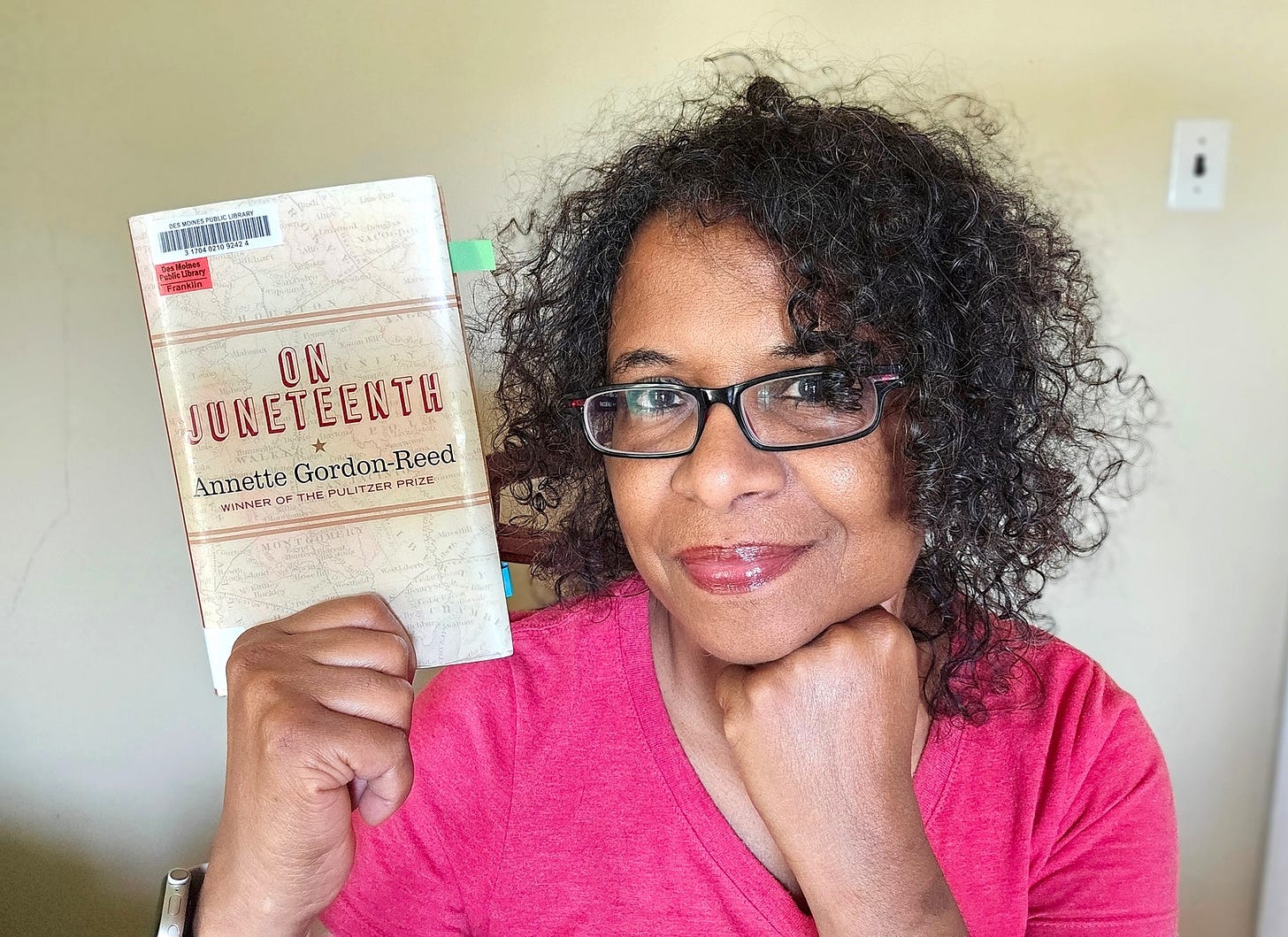Juneteenth is on my mind. Namely because the federal holiday is coming up on June 19, 2024 and I will be participating in the following Juneteenth events:
June 18, 2024, 6:00 - 7:30 PM—Author Talk and Book Signing with fellow author Jim Tillman at the African American Museum of Iowa
June 19, 2024, 12:30 - 9:30 PM—Emceeing and sharing history, plus working a puppet in Eulenspiegel Puppet Theatre’s “Remembering Buxton” show, at Ottumwa’s “Unity in the Community” Juneteenth celebration
Which is why author Annette Gordon-Reed’s book, On Juneteenth, caught my attention. Gordon-Reed starts with a definition:
June 19, 1865, shortened to “Juneteenth,” was the day that enslaved African Americans in Texas were told that slavery had ended, two years after the Emancipation Proclamation had been signed, and just over two months after Confederate General Robert E. Lee had surrendered to Ulysses S. Grant at Appomattox. Despite the formal surrender, the Confederate Army had continued to fight on in Texas until mid-May.
After they finally surrendered, Major General Gordon Granger announced the end of legalized slavery in Texas via General Order Number 3 in Galveston, Texas.

On Juneteenth is memoir, family history, and American history rolled into one and, as Gordon-Reed points out in the Preface, the essays in its six short chapters are meant to provide context for the event, not present Texas history in chronological order.
I was drawn to the Texas history peppered throughout the book.
The cultivated image of Texas is missing a key figure
Gordon-Reed shares the three dominant figures that embody Texas: “The Cowboy, the Rancher, the Oilman,” all of which have been romanticized by lore, television/movies, and Texans themselves.
There’s a key feature she believes they all have in common:
Of great importance, as I have said in another context, the image of Texas has a gender and a race: ‘Texas is a White man.’ What that means for everyone who lives in Texas and is not a White man is part of what I hope to explore in the essays of this book.
But there’s one figure notably absent from this embodiment: “the Slave Plantation Owner.”
It wasn’t cowboys, ranching, or oil that lured Anglo-Americans to Texas
Southern-born Stephen F. Austin, purported to be “the Father of Texas,” arrived in Texas with a goal in mind: To transform the rich, fertile soil of east Texas into the wealth-generating, cotton fields of the South. Neither he, nor many of the Anglo-Americans he sought to recruit, wanted to personally do this. Instead, they wanted enslaved Blacks to clear the land, and plant and harvest and maintain the crops.

The Mexican government welcomed Anglo-Americans to its territory, Coahuila y Tejas, in hopes they would not only develop the land, but also help protect against the Comanche attacks. But having just won independence from Spain, most Mexicans were antislavery. Gordon-Reed writes:
Austin told everyone who would listen that, without slavery, the Anglo colonies would never fully succeed and Americans who came to Texas would surely be poor for the rest of their lives.
Under Austin’s—and his supporters’—incessant lobbying, the Mexican government granted exemptions which allowed chattel slavery. But these new Texans doubted the permanence of the exemptions. So, they rebelled and declared their independence from Mexico. In 1836, the Republic of Texas was born and the influx of Anglo-American settlers began.
But as cries for abolition grew louder in the U.S. in the 1830s and various trading partners, like Great Britain, abolished slavery, along with Mexico’s refusal to accept their independence, Texas joined the Union in 1845, hoping its alliance with the pro-slavery South offered some protection.
Twenty-years later, their hopes were dashed. As Gordon-Reed put it, “... the armed forces of the United States shattered Texas’s dream of a cotton-based slave economy when it defeated Texas and its fellow Confederates in the Civil War.”
Blacks were whipped for celebrating emancipation
Many White Texans were livid at having to concede defeat. Some Confederate soldiers looted and rioted. Through the use of violence, some White Texans forced Blacks to work for no pay and remain enslaved. Some White Texans inflicted violence on Blacks expressing joy at emancipation. “In one town,” Gordon-Reed writes, “dozens of newly freed enslaved people were whipped for celebrating.”
While this violence against Blacks occurred throughout the South after emancipation, it was particularly notable in Texas.
As previously mentioned, Texans continued fighting after Confederate General Robert E. Lee surrendered. The last battle—the Battle of Palmito Ranch, which was close to Brownsville, Texas—was fought on May 13, 1865. Texas won. But on June 2, 1865, the Confederate Army of the Trans-Mississippi was forced to surrender to the U.S. Army in Galveston, Texas because the Confederate armies elsewhere had collapsed.
Gordon-Reed points out why White Texans may have been more resistant to accepting defeat than other White Southerners:
It has been suggested that this was because, unlike other Southern states, Texas had not been defeated militarily. They had won the last battle of the Civil War. That the state had been its own Republic, within the living memory of many Texans, also set them apart from the other Confederates.
Why Juneteenth is important
To me, Juneteenth is another opportunity to reflect on what Black people have gone through, along with all we have achieved and continue to achieve. Additionally, as Jemar Tisby stated in a Courier Journal column earlier this month:
Making Juneteenth a national holiday creates an annual ritual that forces us to look again at the history of slavery and freedom in this country so we can continually assess where we’ve come from and where we are going.
While my focus was on the Texas history behind Juneteenth, in its 152 pages, On Juneteenth introduced many more topics than I mentioned here. For more information, check out the details on the publisher’s website.
I’m a proud member of the Iowa Writers’ Collaborative, a group of 50+ talented writers, covering a myriad of topics. Check out their columns below. Also check out Black Iowa News and Iowa Capital Dispatch, two great publications that sometimes carry our stories.





Thanks for continuing to present info in your columns we should all know but sadly do not.
More history I didn't know. Texas succeeded from TWO unions over slavery. Thanks.